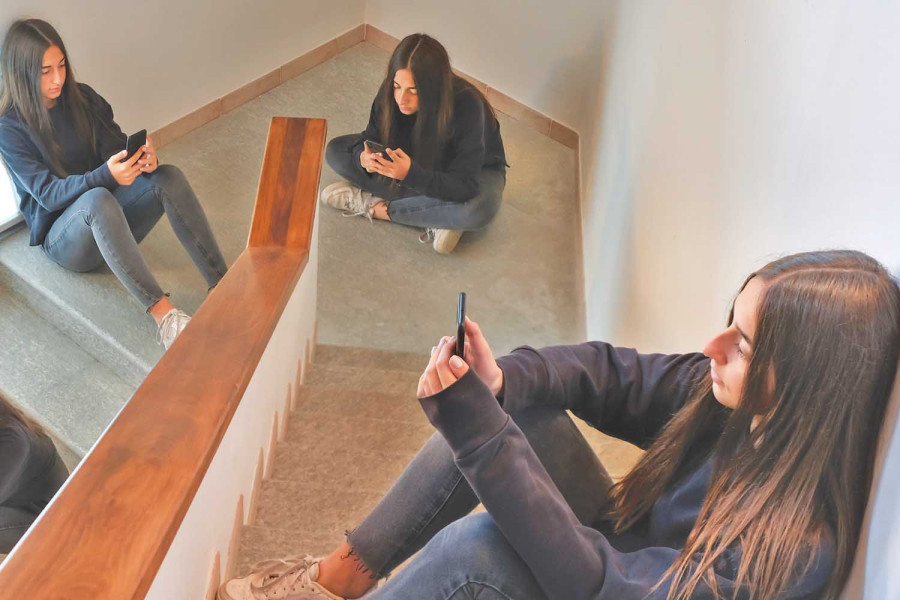Health
Children, teens show mental health problems after Gen Z protest
Experts say anxiety and sleeplessness have become more severe on those already having mental health issues.
Arjun Poudel
An eight year-old girl from Kathmandu was rushed to Kanti Children’s Hospital, Maharajgunj after she stopped sleeping in the night and remained anxious all the time. Doctors attending the patient said that the girl had been telling her parents to leave the house, fearing someone could set it on fire.
“The girl’s parents complained that she screams and cries even when they go to the washroom and close the door,” said Dr Arun Kunwar, child and adolescent psychiatrist. “Her parents worried that even small sounds or noise of people talking nearby makes her fearful. The girl also feared going to school.”
As many people across the country have been still in shock over deaths and devastation triggered by last week’s Gen Z protest, this has become a common refrain among hundreds of children and adolescents, who were taken to hospital for treatment or kept at home despite having problems.
According to the latest count, at least 74 people have been confirmed dead and over 1,800 injured in the protest launched by youths against rampant corruption and social media ban, after the toll rose with more deaths among the injured and bodies were found in burnt buildings.
“The number of children and adolescents having mental health issues triggered by last week’s Gen Z protest have increased significantly in our hospital,” said Kunwar. “Many patients have acute stress reactions, which cause insomnia. We have also prescribed sleep medication to some patients.”
Problems are more serious among those, who were already having mental health issues. Many people were shocked when they saw the terrifying scenes of the mayhem on social media or television, last week. Doctors say some of the children and adolescents had seen devastation on their own, and some had even taken part in the protest.
“One of the patient’s friends died in the incident,” said Dr Basudev Karki, a consultant psychiatrist at Nepal Mental Hospital. “The patient had suicidal thoughts and complained that there is no point in living.”
Most patients have sought treatment at the hospital’s outpatient department, some have visited private clinics. Doctors and mental health experts the Post talked to said that most patients suffer from sleep disorders. They recount the incidents repeatedly and get worried about the repetition of the incident. Some feared leaving home or going to school.
“A 16 year-old girl has been brought to our emergency at present, and she is also disturbed by last week’s incident,” said Karki. “We have been teaching relaxation techniques and prescribing sleep medication to others.”
Experts—psychologists and psychiatrists—say the flare-up of mental health issues in the aftermath of major disasters is a common phenomenon. They alerted the authorities concerned to the risks and called for timely measures to address them.
“The rise of mental health problems in the aftermath of disasters is an obvious occurrence, not only in Nepal but everywhere,” said Dr Karki. “So the agencies concerned should prepare for it.”
According to a study carried out in the aftermath of the Gorkha earthquake of 2015, which killed around 9,000 people and injured thousands and displaced hundreds of thousands across the country, there was a 34 percent rise in anxiety and depression in the major quake-hit districts—Kathmandu, Gorkha and Sindhupalchok.
The study found a 20 percent increase in alcohol use and an 11 percent increase in suicidal thoughts among the displaced people.
Excessive anger was reported by around 34 percent of the respondents. Over five percent of people had elevated rates of posttraumatic stress disorder. The report shows that 42 percent of people reported that ‘distress’ was a serious problem in their community.
Likewise, mental health problems surged during the Covid pandemic (2020-21).
Experts say ensuring easy access to counselling services, timely detection of mental health problems, imparting life skills, and creating general awareness are some ways to address mental health problems.
Meanwhile, the Ministry of Health and Population said it has discussed with multiple stakeholders including the UN agencies–representatives of the World Health Organisation, United Nations Children’s Fund and multiple other national and international organisations about the growing mental health issues.
“We have decided to launch measures for the next six months,” said Dr Phanindra Baral, chief of the mental health section at the Epidemiology and Disease Control Division. “We have also decided to launch awareness campaigns via social media platforms, which Gen Z uses the most.”
Officials say that health workers have also been instructed to assess the psycho-social condition of vulnerable populations, and school health nurses have been asked to identify students suffering from mental health trauma, among other issues.
They say reports of a surge in mental health problems have also been coming from districts following last week’s violent protests.




 13.12°C Kathmandu
13.12°C Kathmandu















